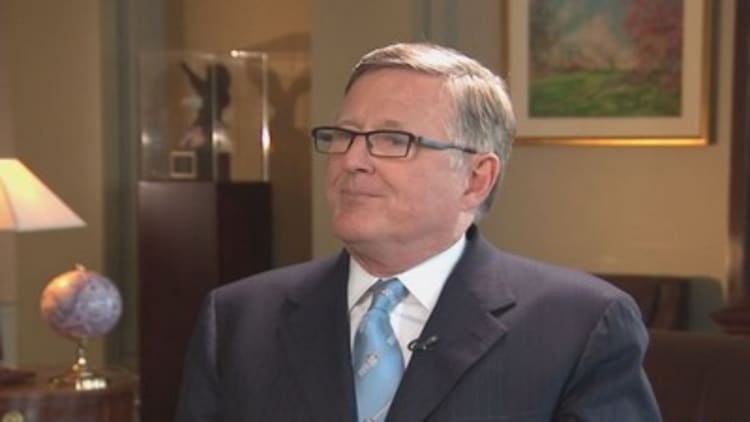
For those investors who spend their nights and days fretting over every market move, David Booth, founder, chairman and co-CEO of Dimensional Fund Advisors, has some advice.
"Let the market do the work for you," he says.
That may sound too passive for many, but this simple philosophy is actually worthy of a Nobel Prize.
Booth started DFA in 1981 based on what he learned attending the University of Chicago. He was inspired by his professor and mentor, Eugene Fama, a winner of this year's Nobel Prize in economics for his research in "efficient market hypothesis."
Fama serves on DFA's board of directors and investment policy committee.
In a nutshell, the hypothesis is grounded in a simple theory: When investing, research wins over emotions.
(Read more: What you should be asking your financial advisor now)
In an interview with CNBC's Sharon Epperson for the special report "FA Playbook," Booth said it is futile for investors to try to outsmart the market or to pick the next hot stock.
"The stock market is so competitive that people kill themselves for the slightest edge, to the point that there's really no edge to be had—so that means trying to outguess the market, and for most people that probably means a losing game," he said.
DFA is a mutual fund empire with more than $300 billion assets under management. The company does not market its funds to individual investors outside of some 401(k) and 529 college savings plans.
(Read more: The best retirement investment you can't have)
Despite not being a household name, DFA is one of the biggest firms in the industry and growing. It is on track to a record year, with more than $16.7 billion in net new deposits through September.
At the firm's core is the belief that investing is a long-term affair that relies heavily on the academics of finance.
"One of the key principals of investing is to develop an investment philosophy that you can stick with through thick and thin," Booth said. How long do you need to stick with that plan? He says 20 to 30 years.
By committing for the long haul, Booth said, investors can avoid being corrupted by those killer emotions—fear and greed.
(Read more: Why 401(k) savers don't have enough to retire)
Pointing to recent history, he said, "It's really a tragedy that so many people lost, say, half of their money in the down market, panicked, got out and missed the subsequent rebound. Stocks now are selling at prices higher than they did five years ago, so if people had just stayed the course they would have been fine."
The best near-term investment opportunities are the same ones he identified last year, said Booth, who continues to recommend a portfolio overweighted toward small companies, lower-priced stocks and more profitable companies.
For retirees, including those into their 70s, Booth suggested including equities in your portfolio to help guard against inflation risks but limit them to 25 percent of the mix.
—By CNBC's Gloria McDonough-Taub





